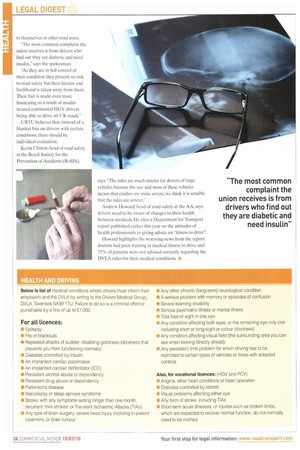HEALTH AND DRIVING
Page 28

If you've noticed an error in this article please click here to report it so we can fix it.
Below is list of medical conditions where drivers must inform their employers and the DVLA by writing to the Drivers Medical Group, DVLA, Swansea SA99 1TU. Failure to do so is a criminal offence punishable by a fine of up to Z1,000.
For att licences:
Epilepsy • Fits or blackouts • Repeated attacks of sudden disabling giddiness (dizziness that prevents you from functioning normally) • Diabetes controlled by insulin • An implanted cardiac pacemaker • An implanted cardiac defibrillator (ICD) • Persistent alcohol abuse or dependency • Persistent drug abuse or dependency • Parkinson's disease • Narcolepsy or sleep apnoea syndrome • Stroke, with any symptoms lasting longer than one month, recurrent 'mini strokes or Transient Ischaemic Attacks (TIAs) • Any type of brain surgery, severe head injury involving in-patient treatment, or brain tumour • Any other chronic (long-term) neurological condition • A serious problem with memory or episodes of confusion • Severe learning disability • Serious psychiatric illness or mental illness • Total loss of sight in one eye • Any condition affecting both eyes, or the remaining eye only (not including short or long-sight or colour blindness) • Any condition affecting visual field (the surrounding area you can see when looking directly ahead) • Any persistent limb problem for which driving has to be restricted to certain types of vehicles or those with adapted controls Also, for vocational licences: (HGV and PCV) • Angina, other heart conditions or heart operation • Diabetes controlled by tablets • Visual problems affecting either eye • Any form of stroke, including TIAs • Short-term acute illnesses, or injuries such as broken limbs, which are expected to recover normal function, do not normally need to be notified.
































































































































